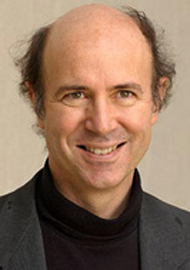
John Wheeler. Photo by the New York Times/Redux.
As a sophomore at Princeton I took a class called Honors Physics from a man named Johnny Wheeler. He wore a suit and tie to class, loved explosions, and created vivid art in real time with colored chalk. Implausibly old, he had worked on nuclear fission with Niels Bohr. He was 61.
The lectures were long on inspiration and short on information about how to do the homework. I was in awe of Wheeler. Some students thought he sucked.
One day I arrived late to find Wheeler conducting a poll. We were voting on the future of science: is there “more to come” or “less to come”? I don’t remember the count, but “more to come” won handily. Wheeler was pleased.
Later, at a student-faculty lunch, Wheeler seemed troubled. He had been asked to explain the essence of quantum mechanics in five words or less, and was stumped. Frank Calaprice, a nuclear physicist within earshot, interjected helpfully, “What we expect to measure?” I was silent.
The question was absurd. It was fascinating. I still think about it. I can’t answer it.
This year I taught a course on quantum statistical physics to Caltech sophomores. I wore khakis and always used the white chalk. Though I’m 59, few students seemed awed. Some thought I sucked. Maybe I did sometimes.
Johnny Wheeler never blogged. If he had, some readers would have been awed. Some would have thought he sucked.
But Johnny would not have reminisced about a class he took 40 years ago. He knew there was more to come.
Welcome to Quantum Frontiers! We hope that the posts to come will be long on inspiration, even if short on information about how to do your homework. Enjoy!









